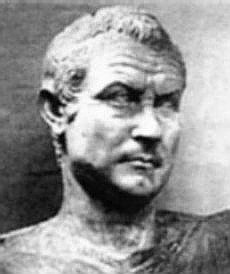- Casina (play)
"For other meanings see
Casina (disambiguation) ."Infobox_Play | name = Casina

caption = Plautus
writer =Plautus
characters = Olympio - slave of Lysidamus
Chalinus - slave of Cleostrata
Cleostrata - wife of Lysidamus
Pardalisca - maid of Cleostrata
Myrrhina - wife of Alcesimus
Lysidamus
Alcesimus
Citrio - cook
setting = a street in Athens, before the houses of Lysidamus and Alcesimus"Casina" is a Latin play by the early Roman
playwright Titus Maccius Plautus . The title has been translated as "A Funny Thing Happened on the Way to the Wedding". There is a stage adaptation as well as film titled as "A Funny Thing Happened on the Way to the Forum," which follows a similar plot.Plautus often employed "stock" characters in his plays. For example, the slave who is free born, the wife that is smarter than her husband, the "dirty old man" chasing after the young lady. In Casina, all three of these are seen.
Plot
Casina takes place on the streets of Athens and the characters are all Greek. There is a beautiful girl Casina, who is being fought for between two slaves. She was abandoned on the door of Lysidamus and his wife Cleostrata, and raised as a servant. Euthynicus, son of Lysidamus fell in love with Casina and wanted to marry her, but as the wedding approached, Lysidamus wanted Casina for himself and he devised and elaborate ruse to get Euthynicus out to the country and have Casina marry his servant Olympio instead. In this way, Lysidamus would be able to have sex with Casina whenever he wanted as she would be the "wife" of his servant in name only. Really she would be concubine to Lysidamus, without his own wife Cleostrata finding out. Cleostrata opposes this plan and wants Casina to marry her slave Chalinus, who would be stand in for Euthynicus until his return from the country.
The conflict between father and son becomes a battle between husband and wife. To fix the situation, Cleostrata proposed to draw lots (the play is also know as The Lot-Drawers) but unfortunately Lysidamus wins. Cleostrata and her servants then devise one scheme after another to keep Lysidamus from collecting his prize. Cleostrata finds out about her husbands scheme to sleep with Casina before Olympio takes her home. She dresses her servant Chalinus as Casina and humiliates both Olympio and Lysidamus by taking advantage of the darkened bedroom in her neighbors home where Lysidamus affair was to take place. In the dark, Olympio has reached under the dress of "Casina": "I put my hands on a...a...handle. But now that I think about it, she didn't have a sword:" that" would have been cold." "It's so embarrassing!!" Lysidamus has been beaten by his wife and his sins have all been exposed to the public. Cleostrata takes him back and life return to "normal." There follows a brief epilogue which explains that Euthynicus returns from the country and he will indeed marry Casina who was really a free-born Athenian when she was taken into the family.
Translations
* Henry Thomas Riley, 1912: [http://www.perseus.tufts.edu/cgi-bin/ptext?doc=Perseus%3Atext%3A1999.02.0097 "Casina" full text]
* W. Thomas MacCary and M. Willcock, 1976
* James Tatum, 1983
* David Christenson, 2008Latin text
* [http://www.thelatinlibrary.com/plautus/cas.shtml "Casina" full latin text]
Wikimedia Foundation. 2010.
